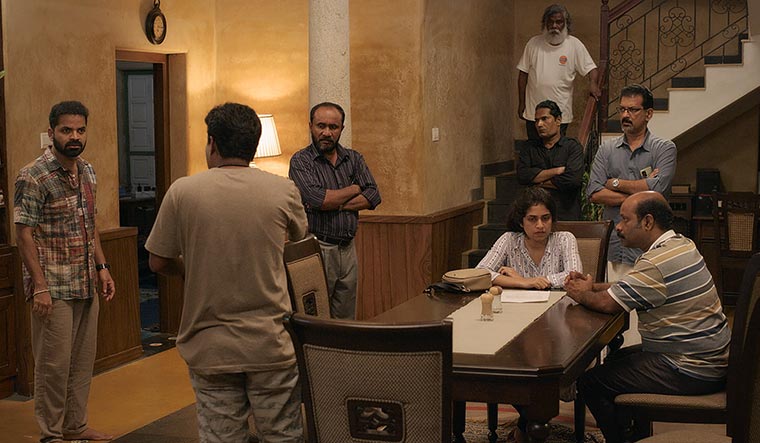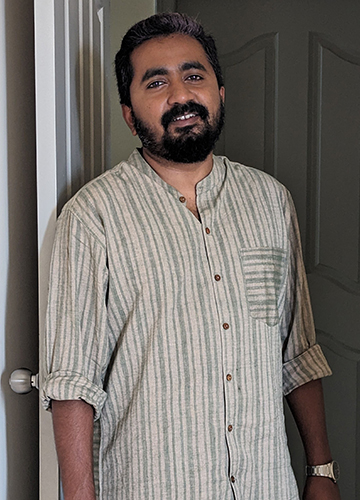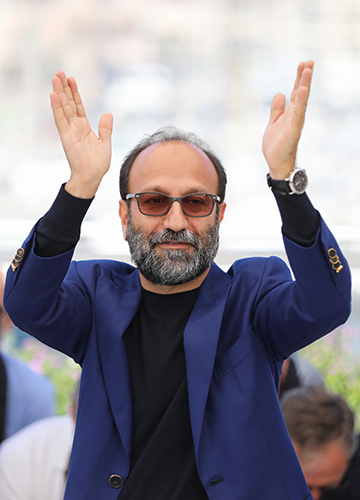On October 13, Aattam (The Play), a Malayalam feature film directed by debutant Anand Ekarshi, had its world premiere at the Indian Film Festival of Los Angeles (IFFLA). With more than 90 per cent of the audience being non-Malayalis, the filmmaker was worried about how they would perceive a dialogue-centric movie, even with subtitles. Post screening, all his concerns were laid to rest. Men and women reacted differently to the film―something he had observed in all the five screenings he had with audiences. The film, which won the Grand Jury Award at IFFLA, explores the outlook of a group of theatre actors who become aware of a sexual crime committed against the lone female artiste by a perpetrator who is hiding among them. “Many of the women spectators told us that they went emotionally numb and silent for a couple of hours after the screening,” says Ekarshi, 35. “Each of them recounted a similar experience in their own lives, navigating situations where they not only confronted sexual violence but also grappled with the challenge of convincing others to believe their account. Meanwhile, the film affected men differently. One guy came to say: ‘Finally, I felt like I got a slap on my face. I felt that I was part of that group [of men portrayed in the film].’”
Aattam will open the prestigious Indian Panorama 2023 section at the International Film Festival of India, to be held in Goa from November 20 to November 28. Its story, says Ekarshi, is not inspired by any particular incident. “Instead, the story formed around the cast,” he says. Except for Kalabhavan Shajone, who plays Hari (seen as an outsider by other characters), and Zarin Shihab, who plays the female protagonist, every cast member in the film, including film star Vinay Forrt, has been associated with the Lokadharmi theatre group at some juncture. Ekarshi, who had also been part of Lokadharmi once, explains that the project originated from a short trip he took with his theatre friends during the pandemic.
“Vinay [Forrt] suggested that we do something for these [theatre] actors,” recalls Ekarshi. “So, the story was crafted for them…. The core idea of the script was not centred around sexual molestation or gender study, but rather an exploration of the theme of group versus individual dynamics. The script delves into the internal journey of an individual and the dynamics of a group. Who pursues truth? Can a group collectively pursue truth or justice, or is this a dimension achievable only by an individual? Because I had 11 men, that became the group. And, the individual became the woman.”
The Sanskrit word ‘Ekarshi’ means one who travels alone, and the filmmaker admits that the writing part of a film is a lonely process. Parallels had already been drawn by many between Aattam and Sidney Lumet’s classic legal drama, 12 Angry Men (1957), which depicted a jury deliberating on the fate of an 18-year-old murder suspect. “While writing the script, it reached a point where 11 men had to discuss a certain crime,” recalls Ekarshi. “That is when I realised it was heading into the realm of 12 Angry Men. However, it felt like a natural progression, and I sensed that forcefully changing it would impact the film.”
However, the actual inspiration for the filmmaker in writing and making Aattam was the works of Iranian filmmaker Asghar Farhadi like A Separation, A Hero, The Past and The Salesman. “How he treats humans, human behaviour, how he generates human tension and how he draws characters for the audience to judge and not judge―he goes very deep [into the human psyche] and I have always loved [it],” says Ekarshi. “That was always something that I wanted to do.”
Though Ekarshi, a postgraduate in applied psychology, had no formal training in cinema, he had been acting in plays since he was 10 and was later part of Lokadharmi. In 2013, he won a national-level short film competition, which, in turn, found him his only stint as an assistant director―for Imtiaz Ali’s Tamasha (2015). “After that, I have done a couple of music videos,” he says. “I was always planning to do my feature film, but doing it requires a lot of time.”
To prepare for his directorial debut, Ekarshi immersed himself in extensive reading, travel and worldly experiences, emphasising the importance of understanding the world for crafting his own screenplays. The meticulous preparation is evident in Aattam, as the film provides cues for diverse interpretations and discussions on a range of issues. Notably, it critiques majoritarianism and delves into the delicate boundary between majoritarianism and democracy. “A collective can make erroneous decisions, especially when personal interests are involved,” says Ekarshi. “So, I have always believed that the individual holds greater strength than the collective.”
The cast also underwent a different kind of preparation; they had to transition from the theatrical style of acting to film acting. “[Of the 11 men], nine had never been on a film set before,” says Ekarshi. He didn’t want them to be intimidated or overwhelmed. And so, he “ conducted rehearsals with a small DSLR camera over 45 days, covering almost 70 per cent of the scenes. The goal was for the actors to internalise their lines, allowing them to focus on nuances and subtleties during the actual filming”, he says.
The actors’ rapport with each other also helped. “Since most of these actors had known each other for about 20 years, we decided to use their real names for their characters, adding an element of truth to their interactions,” says Ekarshi.
The filmmaker acknowledges that addressing a story about molestation inherently involves delving into a political dimension, which he saw as an inevitable challenge. He sought to approach it genuinely and humanly, emphasising that he did not consciously cater to popular opinions or pursue political correctness in his film.
“Honestly I don’t know what political correctness is, and I have no intention of preaching anything of that sort,” he says. “I just wanted to write a compelling story. If you look deep into the people, all the men over there, you cannot say that everyone is wrong or everyone is right. It is a grey situation. Like, when people face complex situations and your morale and sense of justice is tested. That is how we become human beings. Like, it is always easy to say what is the ‘correct thing’ when it is happening in other people’s lives. But when it occurs in your own life, things change. This is what I wanted to talk about in the cinema. Trying to appear politically correct, be it in life or art, is a major fault. Then you are living a very unreal life; you would require putting on a mask to please people. That is the last thing I would want to do.”




